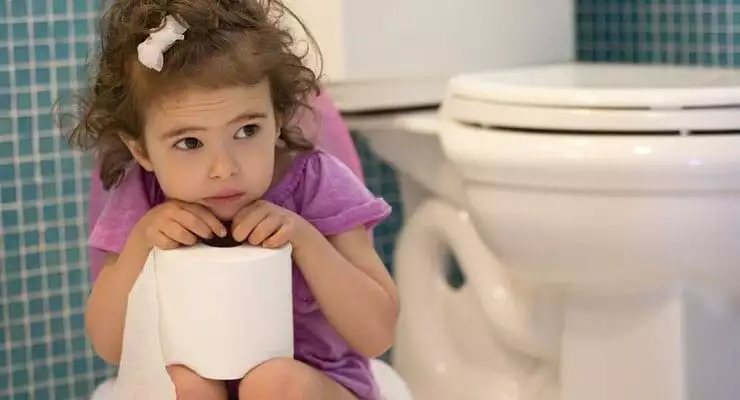The appearance of toddler stools change in consistency due to diet and overall health. Loose stools don’t always constitute toddler diarrhea, which is also known as chronic nonspecific diarrhea. Childhood diarrhea is watery and usually causes your toddler to have bowel movements more frequently than normal. Diarrhea is often treated at home, but some cases of toddler diarrhea warrant a trip to the doctor.
Causes of Toddler Diarrhea
Toddler diarrhea occurs for different reasons. The cause sometimes determines the treatment options. Diarrhea typically runs its course quickly, but sometimes the root cause needs to be treated to stop diarrhea. Potential causes of toddler diarrhea include viral infections, bacterial infections, parasites and ear infections. A child taking antibiotics for another health problem might experience diarrhea from the medication, which throws off the bacterial balance in the intestines. Dietary causes for diarrhea include excessive juice consumption, food allergies or food intolerance.
Fluids
Increase your child’s fluid intake during a bout with diarrhea. Water is the best option for keeping your toddler hydrated. Electrolyte drinks made for children help by replacing the salt and water that is expelled in diarrhea, according to the American Academy of Pediatrics. Avoid sugary drinks like juice and soda as your child recovers. The sugar could make diarrhea worse.
Diet
The BRAT diet — bananas, rice, applesauce, toast — was once recommended for children with diarrhea as a way to ease the body back to normal. The BRAT diet won’t hurt during diarrhea, but the American Academy of Pediatrics says that most kids can eat a regular diet of solid food with diarrhea unless it is accompanied by vomiting. A normal diet of healthy food supplies your child’s body with nutrients to help him fight off an infection if that is the cause of diarrhea. Increasing your toddler’s fiber and fat intake slowly may help with diarrhea. Yogurt with live cultures might help restore the balance in the intestines to help clear up diarrhea.
Comfort Measures
Time is often the best cure for diarrhea. Some children aren’t bothered by diarrhea, while others may feel uncomfortable. If your toddler is still in diapers, change her diaper immediately after a bout of diarrhea. Clean her bottom carefully and make sure it is dry before applying diaper cream. Diarrhea may irritate the bottom and result in a diaper rash. Holding your child and proving her with emotional support may also comfort her.
Medical Intervention
Certain cases of diarrhea require medical intervention. Call your child’s doctor if diarrhea includes blood, is greasy or is black. A trip to the doctor might be necessary if your child experiences severe abdominal cramping or other symptoms such as vomiting, fever or ear pain. These symptoms could indicate a more serious problem. Seek medical care if your child shows signs of dehydration.
Symptoms include less urination, crying without tears, dry mouth, losing weight, lethargy or sunken eyes, according to AAP.
Another reason for medical intervention is if you suspect the diarrhea is a food-related reaction. Diarrhea and other digestive problems typically appear within a few hours if they are caused by a food allergy. Seek medical attention immediately if your toddler also has breathing difficulty or swelling in the face, signs that could indicate a severe allergic reaction.





